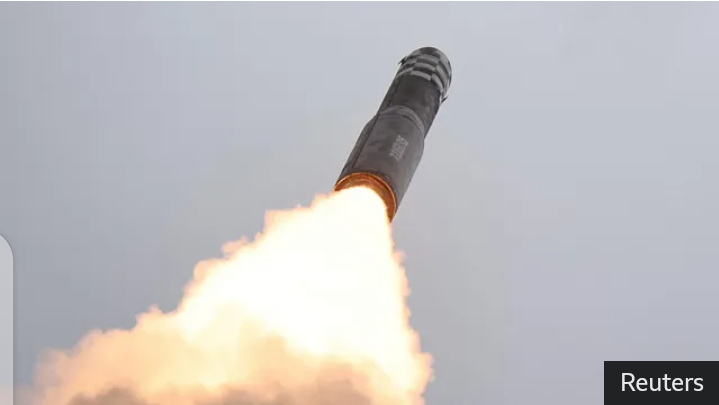North Korea Conducts Record-Breaking Missile Test Amid Rising Tensions.
North Korea has conducted a test of an intercontinental ballistic missile (ICBM), marking the longest recorded flight duration for its missile tests. According to South Korean and Japanese authorities, the missile remained in the air for 86 minutes and covered over 1,000 kilometres before descending into waters off North Korea’s east coast.
Launched at a steep angle, the missile reportedly reached an altitude of 7,000 kilometres. Analysts suggest that if fired on a horizontal trajectory, the missile could have covered a much greater distance, demonstrating North Korea’s progress in missile range capabilities. Thursday’s launch comes amidst escalating tension on the Korean Peninsula, with increased aggressive rhetoric from Pyongyang towards Seoul.
In response to this development, Seoul’s Defence Ministry indicated that the test aims to further North Korea’s ambitions to produce missiles with greater range and altitude capabilities. South Korea has stated that it will introduce new sanctions against Pyongyang, with the United States condemning the launch as a “flagrant violation” of United Nations Security Council resolutions.
The White House’s National Security Council spokesman, Sean Savett, remarked, “This only demonstrates that North Korea continues to prioritise its unlawful weapons of mass destruction and ballistic missile programmes over the well-being of its people.”
In a rare statement published on North Korean state media, leader Kim Jong Un defended the missile test, calling it “appropriate military action” and reaffirming his country’s commitment to strengthening its nuclear arsenal. Kim Jong Un stated that North Korea “will never change its line of bolstering up its nuclear forces” in response to perceived threats from its adversaries.
Experts in North Korean affairs believe the launch may have been conducted to further develop the capability of North Korea’s missiles to carry larger or multiple warheads, potentially reaching the US mainland. Kim Dong-yup, assistant professor at the University of North Korean Studies, noted the missile’s development suggests it is being designed to deliver heavier payloads over vast distances.
Following the launch, officials from South Korea and the US convened and announced a commitment to “take strong and varied response measures.” Japan, which closely monitored the test, has coordinated with South Korea and the US to enhance regional security. The South Korean military affirmed it is in “full readiness,” working closely with US and Japanese counterparts to monitor North Korea’s missile activity.
This missile test follows recent accusations by the US and South Korea that North Korea has dispatched troops to Russia to assist in Vladimir Putin’s military campaign in Ukraine. Pentagon sources suggest that approximately 10,000 North Korean troops have travelled to Russia, with some reportedly stationed in western areas near Kursk.
The alleged deployment of North Korean soldiers to Russia underscores growing military and political ties between Pyongyang and Moscow, heightening international concern. Neither North Korea nor Russia has publicly addressed these claims.



